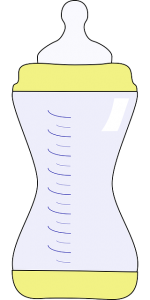Continuing milk: how important and how much?
Milk is a very important requirement for meeting a baby’s nutritional needs.
When he begins to increasingly take several spoons of cereal, vegetables or other solid foods his milk intake can be reduced. Between 9 to 12 months, about 500 ml to 750 ml( ½ to ¾ litre) of milk till he is 5 years old.
Between 9 to 12 months, about 500 ml to 750 ml( ½ to ¾ litre) of milk till he is 5 years old.
Children below 5 years must only be given whole milk and not skimmed or semi-skimmed milk, which are deficient in energy and essential fat soluble vitamins.
Milk can be partly replaced by other calcium containing foods like cheese, yoghurt and other milk products.
Fruit juices
Fruit juices contain vitamin C. you may begin giving orange or mosambi juice (after careful hygienic extraction and removal of seeds) to a breast-fed baby at around 4 months of age. He should initially be offered two teaspoons of juice diluted with equal amounts of boiled and cooled water.
The amount of juice may be gradually increased to about 60 to 75 ml (2 to 2 ½ oz), diluted with equal amounts of water. Later, the child can have undiluted fruit juice.
Contrary to widely held belief, fruit juice does not cause common cold, cough or fever in a child. You should not warm up the fruit juice before giving it to your baby as the heat would up the fruit juice before giving it to your baby as the heat would destroy vitamin C and thus nullify its nutritive value.
The widely publicized soups of different brands (including chicken soup) and the much glorified broths and lentil water (dal ka pani) have little nutritive value; these should not be given to babies.
Their intake would lead to reduced intake of milk and other nutritious foods by the baby.
Older children can, however, occasionally have soup as an appetizer as and when it is prepared for the family.